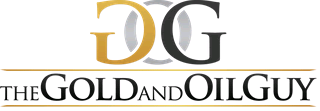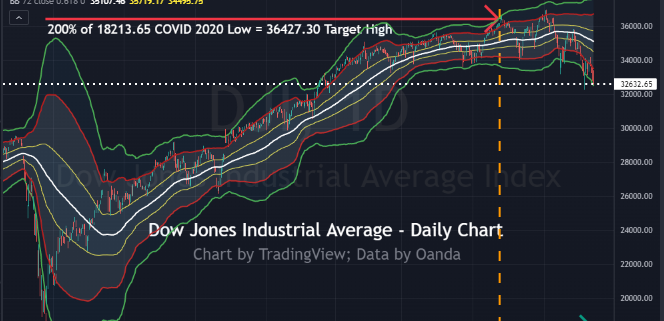How You Can Minimize Trading Risk & Grow Capital During A Global Crisis
To minimize trading risk and grow capital during a global crisis is somewhat hinged on the answers to speculative questions. How long will the Russia – Ukraine war last? How high is the price of oil and gas going to go? How quickly will central banks raise interest rates to counter high inflation? What assets should I put my money into? Knowing what the Best Asset Now (BAN) is, is critical for risk management and consistent growth no matter the market condition!
‘BUY THE DIP’ or ‘SELL THE RALLY’? – DJI Weekly Chart

As of 3/8/22, YTD returns are: DJIA -10.20%, S&P 500 -12.49%, Nasdaq 100 -18.70%
The Dow Jones Industrial Average traded as high as 36952.65 on January 5, 2022
The DJIA put in a Covid 2020 Low of 18213.65 on March 23, 2020. When you double the price of this significant low, you get a price of 36427.30, which the DJIA reached on November 4, 2021. This was precisely 591 calendar days from the 2020 low. The 200% level seems to have capped the bull rally. If, in fact, this is the top and the start of a bear market, we should experience high volatility both up and down. However, the highs and lows should be lower as the market begins to trend lower. The volatility will also continue to increase as the market deflates and continues to lose capital.
Sign up for my free trading newsletter so you don’t miss the next opportunity!
It appears this scenario may very well coincide with the fundamental current events of high inflation, central banks unable to add stimulus, having to raise their interest rates, and current/future geopolitical events.
What-To-Do Before the Storm Hits
“Have A Plan and Stick-To-Your-Plan”
There are some basic strategies or practices that professional traders utilize to minimize trading risk and grow capital. Here are a few ideas:
Bull/Bear Markets – In an upmarket, you should buy the dips. In a down market, you should do the opposite and sell the rallies. Rallies in a down ‘bear’ market tend to be very fast and short-lived.
Diversification – Don’t have your eggs in too many baskets. It is better to navigate thru a storm by focusing your resources specifically rather than generally.
Leverage – Reduce leverage, position size, or know how you will respond to different percentage losses or gains. Understand what your investment objective is as well as your tolerance for risk. If you’re having trouble sleeping at night, you should reduce your holdings to the place where you are comfortable.
Leverage is a mathematical equation, and it does not have to be 1x, 2x, etc. It can also be 0.75x, 0.50x, etc. You get to decide what’s best for you and your family. Leverage is also a double-edged sword! Be careful, especially when the markets are on edge and volatile.
Where is the Institutional Money Going?
The global currency market, otherwise known as Forex or FX, is the largest market in the world. According to the BIS Triennial Central Bank Survey, published on December 8, 2019, by the Bank for International Settlements, it has an average daily transactional volume of $6.6 trillion.
By tracking global money flow, we can get a pretty good idea of where the smart money is going. For now, let’s see what has happened during the last 6-months.

According to www.finviz.com, we notice that the US Dollar, despite its Covid stimulus spending spree, was the preferred currency. However, the Eurodollar has seen substantial outflows decreasing by -7.60%, which is entirely understandable with the Russia – Ukraine War at their doorstep.
Global central banks ponder how quickly to raise interest rates in order to curb high inflation!
According to TradingEconomics, the current global interest rates by major country are: United States 0.25%, Japan -0.10%, Switzerland -0.75%, Euro Region 0.00%, United Kingdom 0.50%, Canada 0.50%, and Australia 0.10%.
The US Federal Reserve may have been looking to raise interest rates by as much as 50 basis points at its next policy meeting. However, given Russia’s invasion of Ukraine, the FED may become more cautious and consider raising interest rates by only 25 basis points on March 15-16. We need to pay close attention to this high-impact market event.
What strategies can help you minimize trading risk and grow capital?
Learn how I use specific tools to help me understand price cycles, set-ups, and price target levels in various sectors to identify strategic entry and exit points for trades. Over the next 12 to 24+ months, I expect very large price swings in the US stock market and other asset classes across the globe. I believe the markets have begun to transition away from the continued central bank support rally phase and have started a revaluation phase as global traders attempt to identify the next big trends. Minimizing risk in order to grow your capital must remain a primary focus for all investors and traders.
Now is the time to keep your eye on the ball!
I invite you to learn more about how my three Technical Trading Strategies can help you protect and grow your wealth in any type of market condition by clicking on the following link: www.TheTechnicalTraders.com
Chris Vermeulen
Chief Market Strategist
Founder of TheTechnicalTraders.com



